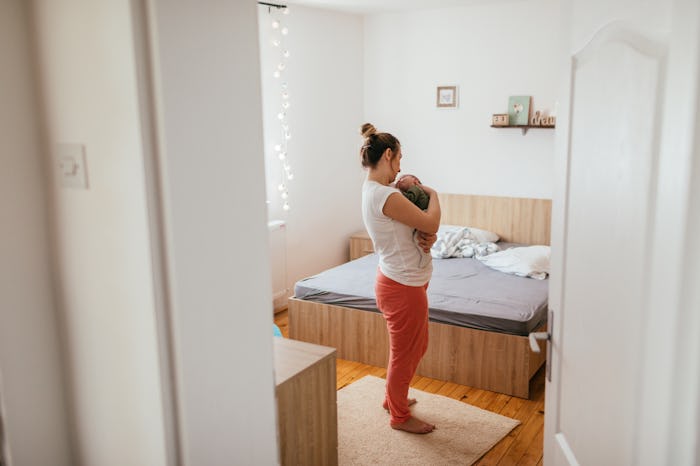Life

How To Sleep Train Your Baby If You're Room-Sharing, According To Experts
The first year of your baby's life will be filled with more ups and downs that you can possibly imagine — and many of them will revolve around sleep training. If you share a room with your child, the prospect of sleep training while room sharing can be a daunting one.
Parents who choose to share a room with their child during their first months of life may feel like they'll never have a space of their own again. Fear not, sleep deprived parents. You can sleep train your child while room sharing. It just may take a little extra patience.
"Sleep training while room sharing can be very successful. As a matter of fact, I’ve worked with numerous families who have done so," Tonja Bizor, a certified Sleep Sense consultant and owner of Tonja B's Sleep Consulting tells Romper.
The most recent American Academy of Pediatrics (AAP) policy statement regarding safe sleep for babies published in 2016 noted: "There is evidence that sleeping in the parents’ room but on a separate surface decreases the risk of SIDS by as much as 50%." The AAP's recommendation is that babies sleep in their parents' room, on a separate infant-safe sleep surface (i.e. a flat surface with only a fitted sheet) for the first year of their life.
"Babies are ready to sleep for long stretches of time (eight to 10 hours of sleep) around 3 to 6 months of age. Parents can allow the baby to go to sleep drowsy at bedtime and learn to self soothe at this age," Miriam Weiss, CPNP-PC, a nurse practitioner and clinical coordinator in the Sleep Medicine program at Children's National Hospital tells Romper. "At the age of 6 months, babies usually receive all nutritional needs during the day and do not require continued night time feeds unless there are concerns about growth.
If the idea of sharing a room with your baby for an entire year while they figure out how to successfully navigate getting a full night's rest sounds like a disaster waiting to happen to you, I totally get it. I am a survivor of a sleep-trained, room-sharing baby who is now a well-adjusted kindergartener, and will be the first to admit that sleep training while room-sharing can be frustrating, but it's totally do-able.
"Some helpful tips include ensuring that the room is quiet and dark, and that the same three to four steps are included in the bedtime routine every night," Weiss says. "White noise may be an option as this can minimize some of the noise the baby can hear when room sharing with others. The parents can keep the room dark and minimize noise when others go to bed in the shared room. Consideration can be made for temporarily moving the other sleepers out of the room while sleep training."
Bizor also tells Romper that if parents can sleep outside of the room for the first two to three nights of sleep training, typically when they return to the room, the baby is not phased by this. Additionally, Bizor notes that while room-sharing and sleep training, some additional measures may be taken to provide an extra layer of independence for your baby's sleep space while they sleep train.
"Place crib away from your bed. The goal is to get baby to sleep independently and if he sees you when he wakes in the night, then he may get distracted versus going back to sleep," Bizor says. "If you have a divider, this would be a great option. Even though you are room-sharing, it can feel like everyone has their separate sleep areas, which promotes independent sleep."
Experts:
Tonja Bizor, certified Sleep Sense consultant and owner of Tonja B's Sleep Consulting
Miriam Weiss, CPNP-PC, Nurse practitioner and Clinical Coordinator in the Sleep Medicine Program at Children’s National Hospital
This article was originally published on